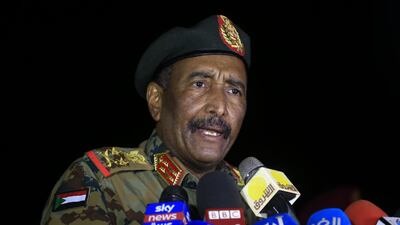The head of Sudan's ruling transitional council, General Abdel Fattah Al Burhan, has condemned the civilian section of the council for holding the military responsible for all of the country's woes.
In a speech to troops on Monday, the military leader hit out at what he said was "a campaign aimed at undermining the integrity of the armed forces."
He was alluding to comments made by the top civilian in the transitional government, Prime Minister Abdalla Hamdok.
Mr Hamdok complained on Friday that his ministers had control over "just 18 percent" of the state sector, seriously hampering their efforts to rescue the economy.
The prime minister returned to the issue on Saturday saying that the "return to the government of businesses owned by the military and the security services is its top priority."
The army and intelligence services acquired huge holdings in the state sector under Al Bashir's rule, in businesses ranging from farming and livestock to private health care and pharmaceuticals.
According to Khaled Al Tijani, editor-in-chief of the business weekly Ilaf, the premier's remarks on army-owned businesses infuriated senior commanders.
"This ignited a social media campaign with political activists blaming the crisis on the military control of the economy," Tijani said.
The council, made up of military officials and civilians, was tasked with paving the way for democracy after last year's revolution toppled autocrat Omar Al Bashir in April and ushered in sweeping changes.
Known officially as the Sovereignty Council, it is an 11-member body of generals and civilians operating as a collective presidency during the 39-month transition until elections are held.
His comments came in response to pressure over the economic hardship the country is facing amid the coronavirus pandemic, with civilian calls for action to be taken against the number of companies owned or funded by the military.
Gen Al Burhan held “the responsibility for the economic failure on the executive apparatus” and accused it of suspending “its failure on the army.”
"No one has the right to suspend his failure on the armed forces," he said.

